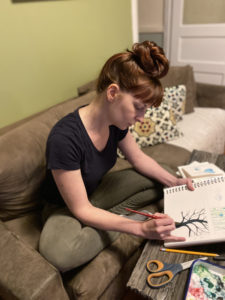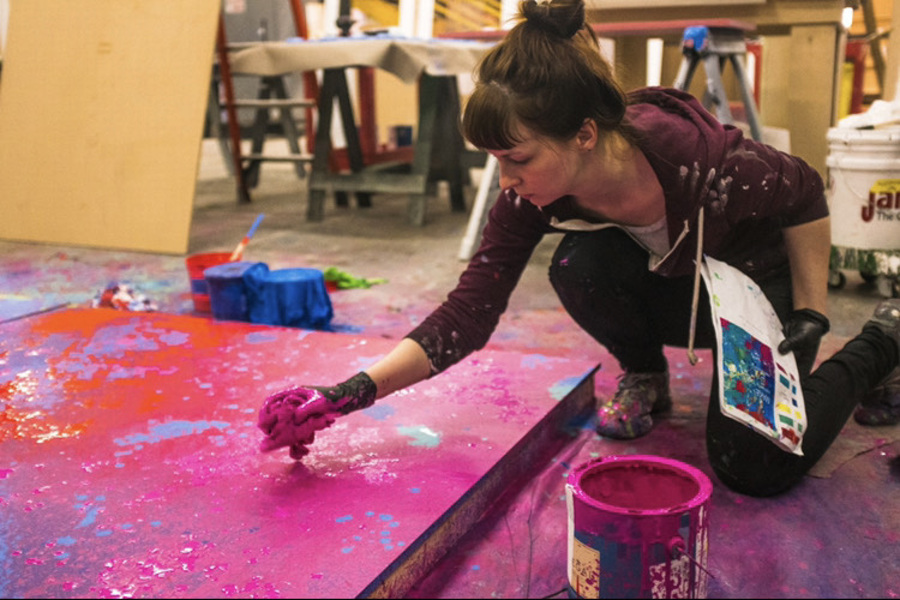Whenever the palliative care team at Bellevue Hospital loses a patient, it takes the time to send the surviving family members a personalized condolence card. Or at least it has traditionally. But since the COVID-19 pandemic reached New York City, the team hasn’t been able to keep up with the demand. Enter freelance scenic artist Nicole M. Carroll, who started painting personalized condolence cards as a volunteer.
“I have made 35 cards in the last four weeks,” said Carroll, who paints watercolor illustrations on the four-by-six-inch cards. “I am not signing my name on any of these cards. This is not for me; this is not for any sort of recognition. If it is any worth to them, they are for a good cause.”
Carroll, who has worked as a scenic artist for the last eight years, was about 90 percent done painting the set pieces for an NYU Steinhardt production of the Benjamin Britten opera Albert Herring when the coronavirus began to take hold in New York. At the NYU Steinhardt scene shop, a relatively small-scale operation, Carroll would typically receive technical drawings for a show from the set designer and then execute the painting portion of the design, replicating the scenic treatment at full scale.
This particular set was to include counters, bookshelves, store shelves, and tabletops all painted to look like old weathered wood. Done with crackle treatment, the edges and the corners of shelves were made to look dusty and the paint was deliberately peeled off to give some wear and tear.
While her coworkers had been hopeful in the early days of the coronavirus’s spread, Carroll said she had a bad feeling about it from the start.
“I had been paying attention to the coronavirus weeks in advance, and something was not right,” she said. “And a few weeks later, NYU informed us that they were ending contract-basis labor, which is what I was.”
Carroll never got to see the full set come together. The April 3 opening performance of Albert Herring was canceled.

Carroll graduated from SUNY New Paltz in 2011 with a degree in performance, but she also began training as a scenic artist during her senior year. She moved directly to New York City and has been there ever since, pursuing the two careers simultaneously. “I like scenic painting, and I love acting,” Carroll said. “One is my passion, and the other one is my means of staying in the industry while also being able to support myself.”
Now both of those trajectories have been ripped away from her.
“This is the only thing I’ve ever wanted to do,” Carroll said of working in the theatre. “It feels like a grieving process, letting go for a while of the thing that you’ve wanted to do for so many years.”
Recently, she has been experiencing waves of sadness and disappointment. It has been a lot to process, a lot to reconcile. “We are definitely at the bottom of the totem pole when it comes to reopening a non-essential business, and I don’t have a Plan B,” she said. “I’m going to have to figure it out.”
Carroll lives in an apartment in Astoria, Queens, with her husband, Salvatore Nicosia, who worked as a light programmer at the Metropolitan Opera before also being laid off. Carroll counts herself lucky to have gotten married last November, before the world went wild.
“A wedding is like producing a show,” said Carroll, who crafted her own wedding, making the bouquets, boutonnieres, and centerpieces herself. “I can’t imagine the amount of stress having to push that wedding date, coordinating different vendors and photographers, would cost.”
While in New York, Carroll has also been working as an actress and is trying to break into film and TV on either side of the camera. She was recently accepted on to the auxiliary list of the United Scenic Artists Union’s Local 829 and was planning on taking their test to one day officially join 829. As a full-time freelancer, she is entirely dependent on how quickly this industry can get back on its feet.
Still, Carroll is aware that the whole theatre industry is hurting and that she could have it much worse than she does right now. She is hunkered down with her husband, and they are safe and healthy. At the same time, she allows herself the space to grieve.
“I’m not sure what I can do to give back,” she said. “But I’ve got all of the art supplies, so I am painting cards.”
Utkarsha Laharia is a Goldring Arts Journalism graduate student at Syracuse University.


